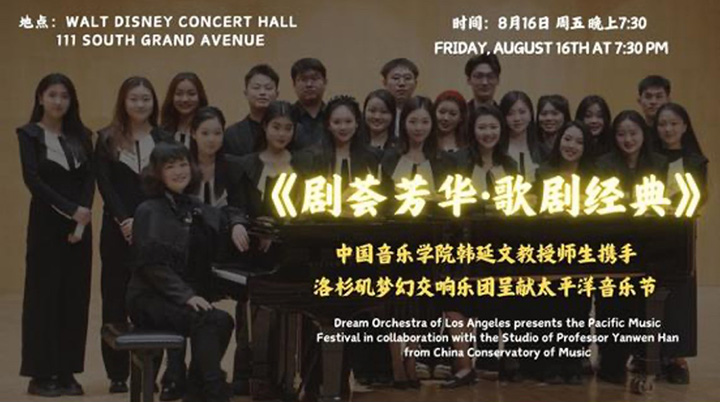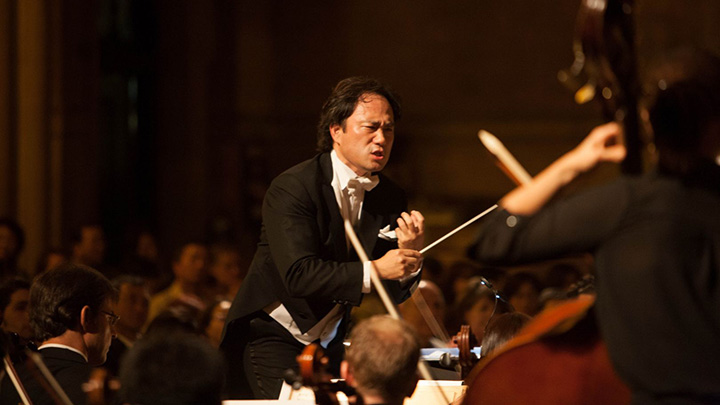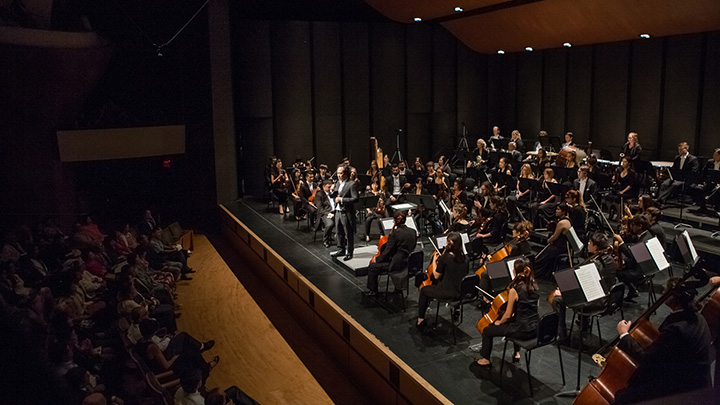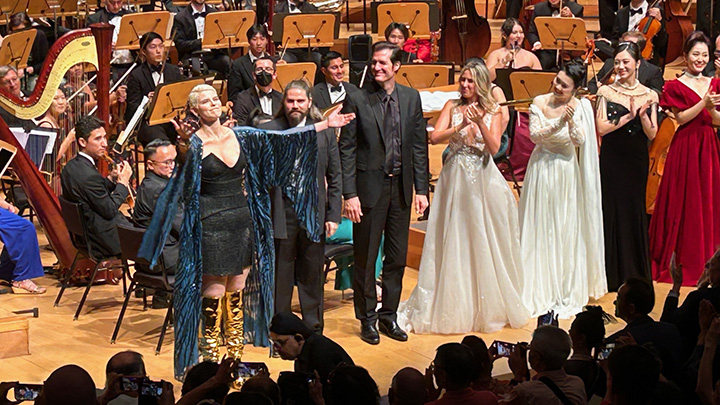Gather round, beloveds, because this is gonna be a tale and depending on the time of day and where you are, it may require coffee or popcorn, too: how yours truly ended up attending a concert of modern Chinese opera, with a predominantly Chinese audience, that due to a preponderance of publicity, some of which was badly translated (A.I., I see you), appeared to be a performance of Puccini’s Turandot at Walt Disney Concert Hall.
Having just seen Turandot at LA Opera (three times, mind you) after a 22 year dry spell here (in the interim I traveled to New York and Santa Fe for productions, plus I have MetOpera on Demand and a Blu-ray player that’s working overtime, so don’t cry for me, Birgit Nilsson), I was agog to come across publicity on the interwebs for “Opera Forever! Celebrating 100 Anniversary of Passing of Puccini with Turandot in Concert!” The syntax is theirs. I did a little research on the announced cast (we’ve all gotta start somewhere, am I right?) and purchased tickets. It was only later when I was deep diving in preparations to write it up that I saw the sub-header “and premiering for the first time in US selections from Chinese modern opera!” Hoo-boy.
When my date and I arrived to the Hall (early and hungry), I looked around the cafe at the rest of us who’d been fleeced for concessions and I realized we were just about the only non-Asian audience members and the only ones speaking English. Still, everyone (mostly ladies of a certain age) was dressed up for the occasion. Bugle beads and silks abounded alongside convivial chatting, so there was some excitement in the air. The audience at LA Opera changes dramatically depending on the ethnic background of the music being performed and/or the performers, so this bothered me not.
So, it wasn’t a complete surprise when our lavishly illustrated programs for the performance were first in English translation and then Chinese. Eleven performers from the China Conservatory of Music had been brought over to perform in the first half along with their illustrious and highly decorated teacher Professor and soprano Yanwen Han.
The Dream Orchestra Los Angeles, in alliance with Dream Philharmonic Society, is a non-profit arts organization that has given performance opportunities to local graduate students and studio musicians since 2011 and is led by Artistic Director and Conductor Daniel Suk. Although they’ve been on my radar before, they’ve mostly concentrated on the big choral works: annual Messiahs in the Cathedral downtown, the Beethoven 9, and the big Requiems. So, this was the first I’d heard of them doing opera, that I recall.
I can’t really speak to the first half of the program since it isn’t my musical background. However, there were some promising voices and there was definitely a focus on ‘performing’ for the audience in a formal classical style and in appropriate costume. Two standouts were the soprano Routang Zhao who sang from an opera based on the Hua Mulan legend and the tenor Xinyu Xie in an aria “What place is this?” from Red River Valley. All of the excerpted operas were musically modern and generally embraced 19th century harmonic language with very lush orchestrations that Maestro Suk fully exploited. A lot of the lyrics tended to the poetic but seemed naive in the extreme (I blame the translations).
Two of the Chinese numbers were backed by the California Philharmonic Art Chorus. They number nearly forty women and about twenty men, obviously an amateur group brought onboard for the occasion. The women all wore matching deep blue sequined gowns with white sashes. Sadly, and nearly inexplicably, their ensembles were louder than their singing (a trend that recurred as the evening progressed).
Consulting my program further it turned out the second half was ‘selections’ (Selections?!?!) from Puccini’s Turandot, but first with three arias programmed as amuses bouches titled “Donne di Puccini” performed by the visiting artists. I’m going to draw a veil across this portion of the program, since we had a Mimi who had absolutely no idea of the words she was singing (and when you’ve got projected titles in Italian and English, that becomes even more apparent than it should be), a Musetta who had a lot of charm but not a lot of voice (and how often has that happened?), and a Tosca who started in Chinese, segued to Italian, and ended in disaster. At this point, I was wide-eyed in my seat and wondering what I’d gotten myself into.
Meanwhile, in the balcony just a few feet above us to the left, there was a claque of ladies convivially chatting throughout the entire first half of the performance. I’m not above a polite ‘Shhh,’ believe me, but I do try to alert the intended target with a death-stare first so as to make themselves aware of their impudence and blatant disrespect to the artists performing. At first, I wrote this off to cultural differences in audience decorum that perhaps I was unaware of (cause every fifth person had their phone out recording). Once we were in Puccini-land, however, my second (more Wagnerian) “Shhh” finally cowed them into silence. Even Miss Manners would have applauded me.
At the break, the Opera Chorus of Los Angeles had taken the spaces formerly occupied by the previous group who’d now been relegated up behind the stage in front of the organ. This new group, also apparently ad-hoc’d for the occasion, comprised thirty-five voices, many of whom I recognized as members of the LA Opera Chorus and Master Chorale, so I breathed a sigh of relief. They made a formidable sound all evening and were magnificent in ‘Gira la cote,’ perhaps even better than what I heard at LA Opera (they’d had plenty of practice).
How, I’m sure you’re wondering, do you cut down Turandot to half an evening’s entertainment? First you excise all the music for the three ministers completely (dammit). Then we essentially got the opening of Act I up to the moonrise and the chorus of young boys; then the double-barreled soprano and tenor arias and a brutally truncated (half) Act I finale. We got essentially the whole second scene of Act II from Turandot’s entrance onward. Then, for Act III, one verse of the Guards leading up to the Operatic National Anthem, Liu’s two arias and her death and the procession, then just the Finale Ultimo, so no final duet at all. I wasn’t happy about it, but it worked.
Now, I actually bought my own ticket to this extravaganza so I’m gonna burn this baby down to the ground…ever so gently. The cast was Chelsea Lehnea as Turandot and Arnold Livingstone Geis (whose name is almost as long as his hair) as Calaf. Soprano Zihan Xiu was Liu for what was left of Act I and Golda Zahra got the remaining acts. Gabriel Manro got a few lines in as Timur with Abidel Gonzalez as The Emperor Altoum. Charles Lane as the Mandarin was the only member of the cast who actually got to sing his entire role.
Now, I want to say up front that the four leads were all singing well above their weight class. However, everyone has to start somewhere. Having heard singers like Karita Mattila and Sondra Radvonovsky early in their careers (and I could name far more), I’m sure not all of us could have had the kind of precognition about the absolute beasts they would eventually become. There are a lot of singers who start out promising and then it turns out that’s all they’ve got. More wonderful is when those early gifts develop into greatness. With opera singers, especially, it takes time and experience. Plus, having a career and making a living as a working singer takes an enormous amount of hard work, skill, and luck. Not everyone becomes a superstar and if that’s what you’re, indeed, shooting for, in 99% of those cases, you need to aim a little lower.
Mr. Livingstone Geis certainly has the raw material. He’s got a burly voice and his pitch is true. I lost some of his vowels on the very top (but he’s in good company there) and his face still turns red on his high notes. He’s young but he did a very commendable job and I look forward to hearing him again. He had a big success with the audience in the aria.
Ms. Xiu was at a disadvantage since she really only had her one showpiece, “Signore, ascolta” and what was left of the final pages of Act I. She has a very pleasant sound although it tends a little towards straight tone. On her two final ascents in her aria, I was worried because she didn’t seem sure. It turned out fine, but confidence seemed lacking.
The only reason I even knew about this production was because of the enormous publicity machine surrounding Golda Zahra. Every time I opened a local emai,l there she was. Giving a recital at my church, performing with the Dream Orchestra at the Broad Stage, and then this. She’s got a beautiful website and her own logo. My impression is that she’s far too young to be on the stage at Disney Hall at this level of performance. In spite of a generally lovely appearance (she was dressed like a princess), the tone is fairly raw and the voice isn’t expansive as it moves up the staff. There’s no natural bloom or freedom. Her dramatic choices need refining, as well.
Chelsea Lehnea has a fairly formidable resume, which makes me think I should have heard of her sooner than now. Her recent write up on these pages with Will Chrutchfield’s Teatro Nuovo sounded promising and was one of the reasons I bought a ticket. Plus, I’m always on the lookout for a budding Turandot. The voice sits very high and bright. She has impeccable breath and her support was nearly faultless. She sailed through ‘In questa reggia’ without a hint of nerves and her pitch wasn’t suspect in the slightest. She sang “Straniero, ascolta!” in one breath and I had the tiniest tingle of greatness. She was good throughout the three riddles and even rode the orchestra at the two big climaxes at the finale. However, the voice is small for the role and she would need a conductor far more responsive to her needs to get through it successfully.
I do need to talk about Ms. Lehnea’s presentation. She entered in an enormous red silk gown with a very high collar and what appeared to be gold boots peeking out from underneath. She also had her close-cropped blonde hair ornamented with something sparkly that I could not discern. It was a very dramatic look, mayhap a bit too dramatic (especially for this concert) but her singing initially canceled out my concern. For the Act III excerpts she came out in a very short black dress (near bustier) with a sparkling blue floor length wrap with long butterfly sleeves now revealing those metallic gold boots to be thigh-high. Those ladies up above me started talking again. If she has any gay friends (and I suspect she must), I’m pretty sure they’re the ones who tried to kill Jennifer Coolidge at the end of The White Lotus.
Which brings us to Maestro Daniel Suk. All evening long, he got an enormous amount of full-bodied playing from his orchestra. In the second half of the Puccini, I don’t think I’ve ever heard the score played louder. The sheer volume was very viscerally exciting, especially in the glorious acoustics of Disney Hall. They had three people working percussion and timpani and I don’t think I’ve ever seen three people work that hard. Hitting this, striking that, gong-ing away. It was almost comical. The problem was, at one point or another, Maestro Suk rode over all of his singers. He was generally inattentive to his soloists and since most of them are fledglings in this piece, it made for a chaotic performance at times. He left his Timur in the dust on more than one occasion and was very little help to the sopranos who needed the most guidance. He was swamping when he should have been supporting.
I should mention that the one magic moment was that the chorus of young boys which Puccini adapted from an existing Chinese melody (Jasmine flower song) was actually sung by the Chinese soloists of the first half sitting in the back row onstage in the original Chinese and not in Puccini’s adaptation of the melody. We got to enjoy that twice and it was fascinating to hear. You can read an interesting article about the music box that inspired Puccini here.
The other thing that made me uncomfortable about this performance was that it felt apparent that this was one of those situations where some of the soloists might have been, directly or indirectly, paying for the privilege to appear. I can only say that it left a bad taste in my mouth.
Photo: Patrick Mack






